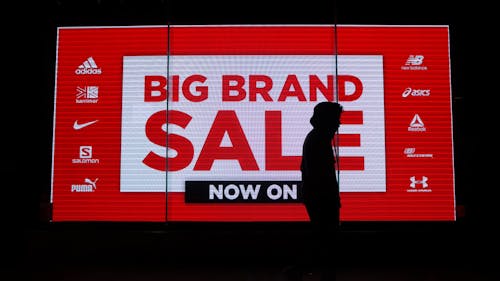SOHAIL: Bleak Friday — Black Friday is losing its novelty fast
Column: Nohman's Nuances

This Black Friday, I bought a coffee machine.
Seldom do I participate in the consumer craze that has swept the nation for as long as I can remember. But as my brother intends to purchase a home in the coming year, I took to the internet to find him a nice housewarming gift.
I went to the Nespresso website, which had a banner celebrating Black Friday strewn across the top of the page, and found a machine that was on sale for $179 with free shipping — a sharp decrease from its retail price of $239.
I thought I was getting a pretty sweet deal, only to check the same website days later to find the price unchanged. Even as I am writing this article, you can still find the "limited-time offer" on the Nespresso website.
With a holiday that has consumer culture at its center, it is no surprise that Black Friday has fallen victim to business practices that sap profits from enjoyable endeavors. As companies finally discover the capabilities of the internet to drive profits, they deploy tactics to use the title of "Black Friday" as a means to increase sales for as long as possible.
Email inboxes are chock-full of messages from companies for days and even weeks after the holiday itself, such as "We've RE-OPENED our Black Friday deals this Cyber Monday," "Don't miss out on MORE savings this Black Friday," "Did YOU miss Black Friday?" and more.
This slew of corporate desperation — accompanied by an arduous process to unsubscribe from such attempts of enticement — invariably leads to Black Friday losing its novelty as a holiday.
Phrases like "for a limited time only" have also lost their meaning, as they accompany most offers to make individuals believe that they will be missing out if they do not purchase an item immediately. These "limited-time offers" seem to always receive supposedly unplanned extensions from businesses that hope to increase revenue marginally.
This phenomenon of corporate greed butchering a hallmark of American consumerism is not limited to the internet. Retail locations across the nation are being exposed for brandishing fake Black Friday sales in their stores — the most notorious case being a viral TikTok in which two people go around Target to reveal ordinary sale signs inconspicuously covered by fancy Black Friday sales that are the same price.
A Target representative came forward to explain that the Black Friday sales existed prior to the actual holiday, but that didn't stop users in the comments from recounting stories of how Black Friday "deals" are manufactured and can sometimes yield prices that are equal to, or even higher than, their pre-sale amount.
The rise of online shopping has seemingly eradicated any need for Black Friday to be a single-day event, but counterintuitively, the urgency associated with Black Friday is the primary reason it was a coveted holiday.
Additionally, the pandemic has clearly caused behavioral changes in consumers, with a mixture of safety precautions and convenience leading to a severe decrease in retail location customers. Last year, an estimated $5.7 trillion was spent on online retail transactions, and this number is only expected to increase.
It does not take any expert or statistician to realize that Americans are becoming increasingly afraid of large crowds. The prospect of violence, mass shootings and stampedes tends to sway opinion more in favor of staying home this holiday season.
Finally, the American middle class is losing money to spend on superfluous goods. Electronics were clearly the center point of Black Friday sales, but now more individuals than ever are spending their last dollar on necessities like groceries and shelter.
Perhaps the loss of the in-store Black Friday novelty is a good thing, as the holiday is notorious for causing "human stampedes" that resulted in injuries and deaths for dozens in the past 17 years.
Nonetheless, it is interesting to observe how in-store and online retailers have reacted to the shift in American technology and values.
Nohman Sohail is a sophomore in the School of Arts and Sciences majoring in economics and political science. His column, "Nohman's Nuances," runs on alternate Tuesdays.
*Columns, cartoons and letters do not necessarily reflect the views of the Targum Publishing Company or its staff.
YOUR VOICE | The Daily Targum welcomes submissions from all readers. Due to space limitations in our print newspaper, letters to the editor must not exceed 900 words. Guest columns and commentaries must be between 700 and 900 words. All authors must include their name, phone number, class year and college affiliation or department to be considered for publication. Please submit via email to oped@dailytargum.com by 4 p.m. to be considered for the following day’s publication. Columns, cartoons and letters do not necessarily reflect the views of the Targum Publishing Company or its staff.



